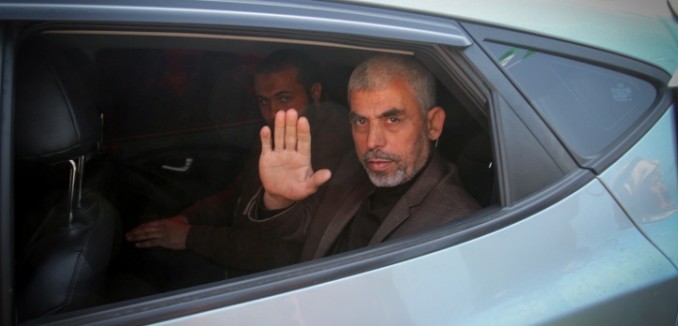The Israeli-Palestinian conflict took center stage once again when Israeli Prime Minister Benjamin Netanyahu visited Washington to meet with President Donald Trump. Amidst speculation over the policy they would adopt regarding the stalled peace process and the wider idea of a regional peace between Israel and its Arab neighbors, one actor was conspicuous in its absence: the Palestinians.
Lack of media attention, however, isn’t the same as lack of activity. In fact, at the same time Netanyahu and Trump were meeting, two significant leadership moves took place in both Fatah, which rules over the West Bank Palestinians, and Hamas, which rules Gaza. Yet far from a sign of change—let alone positive change—both developments can be understood as a ratification of existing trends.
In the West Bank, Fatah’s Central Committee, the movement’s highest decision-making body, convened with little fanfare on the same day Netanyahu was feted by the White House. The gathering was ostensibly intended to pick a deputy and likely successor to the chain-smoking 81-year-old Fatah chairman and Palestinian Authority president Mahmoud Abbas.
The issue of succession isn’t a mere academic exercise. Abbas is in the 12th year of what was supposed to be a four-year presidential term, the Palestinian parliament has lain dormant for a decade, and no elections are expected anytime soon. As a result, the Palestinian Authority has increasingly come to be ruled by a small clique centered on Abbas, and open dissent is rare.
Many in the international community want to know precisely what will happen when Abbas leaves office (either politically or biologically). But Abbas has thus far refused to name a successor. All of this raised expectations ahead of the Central Committee meeting—expectations that were ultimately dashed.
The Central Committee did pick a new vice chairman, the 67-year-old Fatah veteran Mahmoud al-Aloul, who is largely unknown to the international community. Aloul is not viewed as a close confidant of Abbas, but he is not an opponent either. His public statements indicate support for a generally hardline but non-violent approach toward Israel. The best that can be said of him is that he has substantial experience. His membership in Fatah goes back to the early 1970s, and he served as governor of Nablus and head of the amorphous grassroots Mobilization and Organization Committee. His election as vice chairman is, in fact, a classic divide and rule gambit by Abbas. Other more popular candidates, like Jibril Rajoub and the jailed Marwan Barghouti, did not get the nod, which would have been significant to their hopes of succeeding Abbas.
Israeli journalists who follow Palestinian affairs carefully do not see Aloul as presidential material, a sentiment likely shared by Aloul’s fellow Central Committee members. In other words, the question of succession is still open. “The successor is the institution [of Fatah],” Rajoub told me in an interview last month in Ramallah. Meaning, the party will then need to pick a candidate and go to national elections, he said. This candidate “has to be able to win the hearts here in Palestine.”
Meanwhile, in the Gaza Strip, winning hearts doesn’t seem to be high on the list of priorities. A few days before Aloul was chosen, reports surfaced that Hamas had elected a new political chief. Hamas internal elections are shrouded in secrecy, with the Islamist movement’s multitude of factions vying amongst themselves. Out of this incoherence emerged Yahya Sinwar, a 55-year-old Gazan and military wing veteran who is viewed as an extreme hardliner even for Hamas. After over two decades in an Israeli prison on multiple murder charges, Sinwar was released in a 2011 prisoner exchange, whereupon he went about consolidating power within the organization. Prior to his election, Sinwar was a bridge between Hamas’s political and military divisions, a sort of “defense minister.”
While many analysts explained Sinwar’s election as a major shift in policy and the effective takeover of Hamas’s political institutions by the military branch, the reality is more nuanced. In fact, the military branch has been calling the shots for over two years.
During the lead-up to the 2014 war with Israel, Hamas politicians sought an agreement with their rivals in Fatah. As one senior Hamas official in the West Bank told me at the time, governing Gaza was taking a toll on the group, which he readily admitted was “in crisis.” But a deal with Fatah was torpedoed that summer by the military branch: first via a terrorist attack in the West Bank financed and directed from Gaza, and subsequently by the choice to engage in an all-out confrontation with Israel.
In post-war Gaza, the military branch has consistently placed its own priorities ahead of everybody else’s, siphoning off much-needed construction material and financial resources to rebuild its tunnel infrastructure and rocket arsenal. Recent efforts to repair ties with Egypt have also stalled, according to Israeli defense officials, due to the military’s reliance on its ISIS allies in the Sinai Peninsula for weapons smuggling. It’s no surprise that a recent offer from Israel’s defense minister to turn Gaza into “the Singapore of the Middle East” in exchange for demilitarization was flatly rejected.
Sinwar and his allies in the military branch are, on the face of it, content with the status quo. In this they aren’t that different from Abbas and Fatah in the West Bank. As Israel and the U.S. are rightly asked about their plans for the peace process, the real question is why no initiative ever emerges from the Palestinian side of this complex, never-ending conflict.
Neri Zilber is a journalist and researcher on Middle East politics and culture, an adjunct fellow of the Washington Institute for Near East Policy, and a research associate of the Rubin Center at the IDC Herzliya. You can follow him on Twitter @NeriZilber.
[Photo: Abed Rahim Khatib / Flash90]




